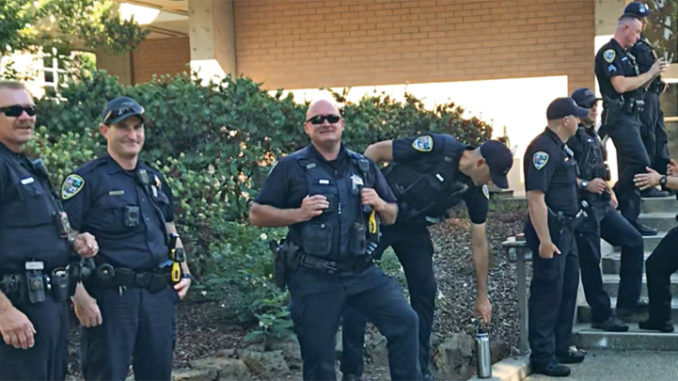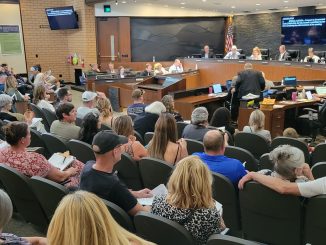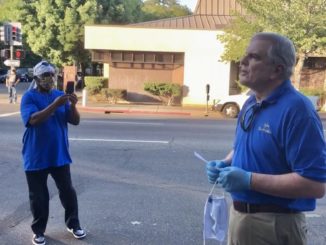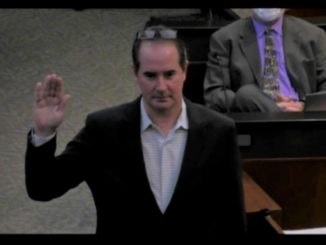
The new conservative-heavy Chico City Council marched forward with its public safety-centric agenda at its second meeting Tuesday (Dec. 15), unfreezing a citywide hiring hold exclusively for the Chico Police Department and advancing a plan to ban sterile syringe service programs.
Both actions resulted from requests to agendize discussions made at the Dec. 8 meeting, with Vice Mayor Kasey Reynolds asking the council to look at CPD staffing and newly seated Councilmember Kami Denlay bringing up a needle program ban.
The city enacted a hiring freeze early in the COVID-19 crisis, when the economic effects of the virus and business restrictions on city coffers were unknown. Contrary to what the owners of dozens of shuttered local businesses and unemployed workers might opine, City Manager Mark Orme offered a rosy statement on the city’s finances that would allow for lifting the freeze.
“Our economy has been extremely resilient,” he told the council. “I don’t entirely know how our dynamic businesses are making it, but they are, and we are still seeing a lot of them succeed and get their bills paid.”
Central to the discussion was allowing CPD to hire seven officers and a sergeant, a move also promised by the conservative slate of four candidates that swept the City Council election in November: Denlay, Sean Morgan, Deepika Tandon and Mayor Andrew Coolidge. During his report to the council, Police Chief Matt Madden said that the city won’t see an immediate effect in hiring new officers, as it takes them about a year to complete police academy and department training. Trainees are paid during this time. Madden said the more immediate benefits would be seen in filling support staff positions.
Ultimately, the council voted 6-1, with Councilmember Alex Brown dissenting, to thaw the freeze, allowing the CPD to fill 17.5 positions. Those include the eight positions (one sergeant and seven officers) already mentioned, as well as four dispatchers, two sworn park rangers, one animal services technician and 2.5 (one working part-time) animal services associates.
The move did not enable hiring for five positions in other departments. Those include an assistant associate planner for the Community Development division and four employees in Operations and Maintenance: one maintenance worker, one senior maintenance worker, an administrative assistant and an airport manager.
Those positions may not have to wait long, however. Orme told the council that upcoming, quarterly budget talks early next year could lead to allowing those departments to hire new workers. In a follow-up conversation Thursday (Dec. 17), he said that discussion is tentatively scheduled for Jan. 19. He also noted that the freeze is “more of a slushy,” with the council giving him authority to hire for all the positions if necessary to deliver city services.
Needle fight, the next round
While pitching for a potential ban on future syringe service programs (SSPs), Denlay—whose request to agendize the discussion was her first major act after taking her seat—referred to it as a “hot-button topic, if you will, in this community.”
That’s something of an understatement. The Northern Valley Harm Reduction Coalition’s efforts to distribute clean syringes in Chico—which began in late 2019—resulted in rambunctious protests, counter-protests, litigation and a legal settlement that forced the organization to stop distributing clean syringes in August. The contention elevated SSPs to a major issue in this year’s elections.
The Oroville City Council enacted a ban in April, and the Paradise Town Council approved a similar measure in October. Chico’s council, with a progressive majority, also discussed the issue, and part of those conversations concluded that state licensing of such programs has overridden other city’s efforts to stop them.
At Tuesday’s meeting, Councilmembers Scott Huber and Brown were outspoken in their opposition to an outright ban. Huber cited a U.S. Centers for Disease Control and Prevention statement on SSPs: “Nearly 30 years of research shows that comprehensive SSPs are safe, effective and cost-saving; do not increase illegal drug use or crime, and play an important role in reducing the transmission of viral hepatitis, HIV and other infections.”
Huber said, “I get that some people are afraid of SSPs or certain service programs, but that fear overlooks the overall benefits and net positives of those programs.”
Brown spoke about likely legal hurdles and reiterated the benefits of SSPs before expressing her dissent. “It seems illogical, and frankly a little bit lazy, of us to disregard the evidence and benefits with an action like this. Just because [something] make us fearful, concerned and uncomfortable doesn’t mean it’s not working; it means we need to engage more thoughtful in dialogue.
“I believe it’s a lazy and callous action we could take,” Brown said.
Denlay downplayed the evidence of SSPs advantages, saying the research isn’t relevant to Chico.
“I think it’s is important to acknowledge that the majority of data provided by these studies do focus on the communities being served by these SSPs and not the community as a whole,” she said. “In addition, these reports and studies are not based specifically on our community.
“I think it’s important to evaluate the first-hand experiences our community has had with SSPs,” Denlay added, claiming that NVHRC’s previous efforts led to dangerous needle litter and enabled drug abuse, and that drug abuse in turn contributes to crimes ranging from domestic abuse to human trafficking. She also claimed drug overdoses are a more prevalent and widespread concern in Chico than HIV transmission, citing police scanner chatter regarding “well over 50 overdoses” in the past year.
In the end, the council voted 5-2 in favor of a motion by Morgan to “direct the city attorney to find any and all legal means to ban SSPs in the city of Chico.” Vice Mayor Reynolds initially seconded the motion, but withdrew her second to allow Denlay to officially do so.




Where is all the money coming from or being diverted from to hire all these new positions? Wasn’t it just a couple of years ago that the City of Chico was having so much difficulty coming up with their CalPers payments?